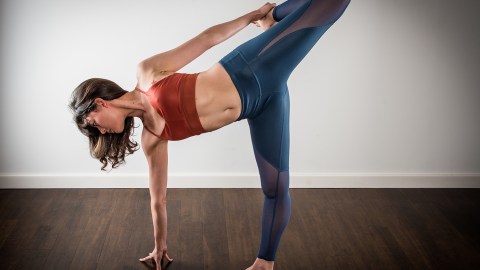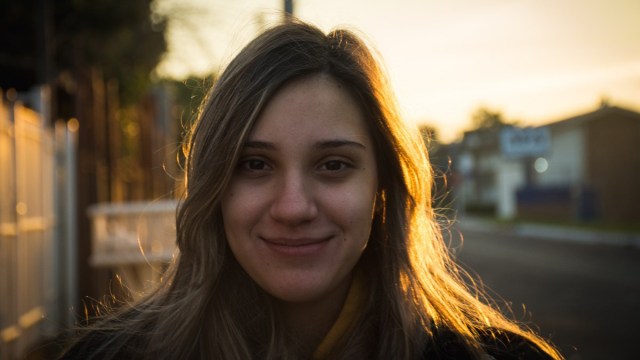New Research Shows Yoga Helps Alleviate Depression

When a practice alleviates symptoms of distress in your life, you’re likely to believe it has therapeutic powers. Anecdotal evidence might not be data, but for individuals suffering from depression, anything uplifting should be considered beneficial—taking side effects into consideration, of course.
Treating depression with a pill might help a person sustain and even thrive in an environment they perceive as negative. If the positive benefits outweigh long-term side effects then it’s a valuable course of action.
Then there’s movement, which in general has less room for damaging side effects. Cardiovascular exercise has numerous benefits on both physical and mental health. This we know. Then there are slower movements, such as Feldenkrais, myofascial release techniques, and yoga.
The latter is particularly close to me, given that I’ve taught it for fourteen years and have practiced it for twenty. It has certainly helped me deal with a range of problems, including anxiety disorder, divorce, cancer, and general feelings of dis-ease. I don’t believe I’ve ever left a class feeling worse than when I entered. Usually I feel better, existential crisis or not.
Yet I’ve remained skeptical of many health benefits assigned to yoga over the decades given how rampant pseudoscience is in that community. A temporary balm is not always a solution. That said, the more research conducted on treating depression with yoga, the more positive the results have been, as is the case with recent studies presented at the 125th Annual Convention of the American Psychological Association.
Lindsey Hopkins, a doctor at the San Francisco Veterans Affairs Medical Center, conducted a study on twenty-three male veterans, a particularly vulnerable group for mental health problems. Each veteran practiced hatha yoga (nearly all asana (postural) classes are based on hatha yoga) twice a week for eight weeks. Their self-reported satisfaction score at the end of the study was 9.4 (from 1 to 10), which measured how much their depression had lessened during that time.
Bikram yoga is an offshoot of hatha yoga performed in a heated room. While I have particular reservations about this style both in terms of excessive heat and some of the twenty-six poses performed in this sequence, I also understand how good you can feel emerging from a ninety-minute sauna session. (I also got strep throat after practicing in one such bacterial breeding ground earlier in my career.)
Researchers at San Francisco’s Alliant University chose fifty-two women between the ages of 24-45 to either take Bikram twice a week for eight weeks or to wait in a control group (they were wait-listed). Self-reported depression scores decreased significantly in the group that practiced yoga.
Another group from Massachusetts General Hospital discovered that the same course of Bikram yoga “significantly reduced symptoms of depression and improved other secondary measures including quality of life, optimism, and cognitive and physical functioning.”
Bikram yoga founder, Bikram Choudhury, is currently running from the law after an arrest warrant was issued due to charges of sexual assault. He was fined $6.8 million, of which he has paid exactly zero dollars. Incredibly, he’s currently running teacher trainings out of an Acapulco hotel, charging between $12,500-$16,600 per student (average trainings in the US are $2,500). So while the effects of Bikram might alleviate depression, it’s also good to know where your money is going.
Fortunately that’s not the only style showing positive results. Nine weekly yoga sessions, each lasting 2.5 hours, were conducted on twelve students in the Netherlands with similar results as the above, with scores for anxiety, depression, and stress all decreasing during the trial as well as four months later.
Finally, a study of 74 university students suffering from mild depression either practiced yoga or another relaxation technique for eight days. During the study both techniques scored similarly in helping depression, but a follow-up two months later showed that the yoga group had significantly lower rates of depression and anxiety.
Physiologically anxiety and depression are similar; the two often go hand-in-hand. For many it is a chicken-or-egg scenario. For me, anxiety disorder sometimes made me depressed, but in general it was panic attacks I suffered through. For others, being constantly depressed brings about a state of anxiety. That yoga alleviates both should not be surprising; it makes sense they’d be studied together.
Lindsey Hopkins takes the results of her study with a grain of salt. While yoga certainly helps alleviate mental health issues, she’s not sure if it’s the only therapy necessary for dealing with long-term depression.
Yoga has become increasingly popular in the West, and many new yoga practitioners cite stress-reduction and other mental health concerns as their primary reason for practicing. But the empirical research on yoga lags behind its popularity as a first-line approach to mental health.
That said, whether used as a remedy or as a complement to other remedies, yoga is certainly helping, and that’s a good sign for all of us.
—
Derek is the author of Whole Motion: Training Your Brain and Body For Optimal Health. Based in Los Angeles he is working on a new book about spiritual consumerism. Stay in touch on Facebook and Twitter.





